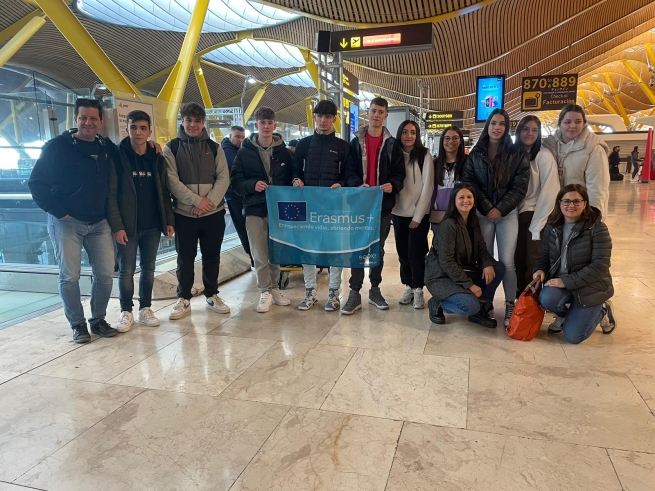From Zaragoza, Pamplona, Madrid, Ciudad Real, Salamanca, Burgos, Malaga, Cartagena, Alcoy, Alcalá de Henares... and many more cities... to Germany, Austria, Poland, Italy, France, Estonia, Greece, Czech Republic, Turkey, Romania, Ireland, Malta...
To provide these experiences, Salesian educational centers are part of the Erasmus network in different ways.
Some, like the Salesian center in Pamplona, have been selected by the European Union as educational centers for Erasmus+ mobility projects for 2021-2027. This makes it easier for them to organize student and teacher mobility during this six-year period.
Others, such as the Salesians' center in Cartagena, are part of the KA229 school exchange partnerships of the same program, which aim to promote cooperation, peer learning, and exchange of experiences between schools at the European level - in this case, these are mainly upper secondary schools.
While in still other cases, educational centers manage, together with European and regional authorities, the mobility they need year by year.
The meetings of the "Salesian Europlanners," annual appointments, the last of which was held in Turin last November, have been crucial to the promotion of this international educational activity.
Coming to the concrete experiences undertaken by the young people of the Spanish Salesian educational centers, the Zaragoza center has 21 students of different specialties who are doing their on-the-job training placements (FCT, in Spanish) in various European countries; the Ciudad Real center has sent 3 students on FCT pathways to Dublin, Ireland; the Pamplona center has sent 13 to Italy; also training in Italy are 10 young people from the "Las Naves" Social Platforms of Alcalá de Henares; of the students from the "Padre Aramburu" center in Burgos, 15 are in training abroad: Italy, Poland, France, Germany; and 5 students from the Salesian center "El Pilar" of Soto del Real are also training abroad.
Nerisa Sobrino Sanabria, one of the young people involved in these foreign training projects, says, "It's been an incredible experience. The people in this city are wonderful. They help us with both the internship and the language, as if we were locals. I'm happy to have had this opportunity because how we are growing here, both personally and professionally, would not have been possible elsewhere."
Among the students from the "Ciudad de los Muchachos" center in Madrid, which has extensive experience in the management of Erasmus + programs, and previously in the European "Leonardo" initiative, 17 will have educational experience in Malta and Italy. Meanwhile, the new "CLIL Erasmus+" project is already underway in Valga, Estonia, with the presence of 3 students and a teacher from the Salesians of the "Juan XXIII" center of Alcoy.
The Salesian center in Cartagena is hosting 30 young Europeans from an Erasmus+ project on water scarcity. The students and teachers in this project, from secondary schools in Greece, the Czech Republic, Turkey, Romania, France, and Spain, have been working together since 2020 on the environmental issue of water conservation as a scarce resource, making the school a place where responsible actions toward nature and its conservation are promoted.
In March, the Triana center welcomed students from Poland through the Erasmus+ program intended for the first grade of secondary school. In the days before Easter, students from the "Trinidad" school in Seville participated in the European project together with a Salesian school from Slovenia. While on the same dates, students from "BSCBerlin" visited the Salesian center in Málaga; and the Pamplona center also sent nine secondary school students to Vals-les-Bains, France, in a twinning experience, part of the KA-121 partnership program, to better understand the Roman culture they learned in class in the previous months.
Finally, the internationalization experience is completed with teacher mobility through participation in shadowing projects and processes (step-by-step learning), whereby teachers from Salesian centers learn and bring back the experiences of education in other European countries.


